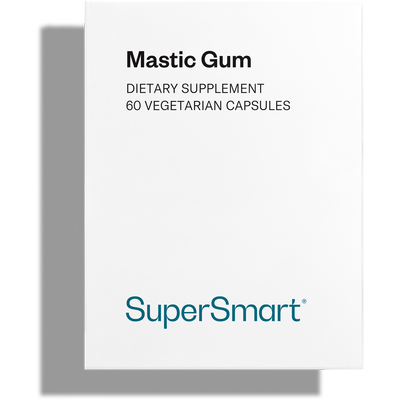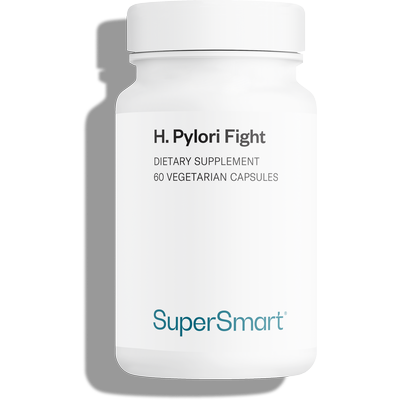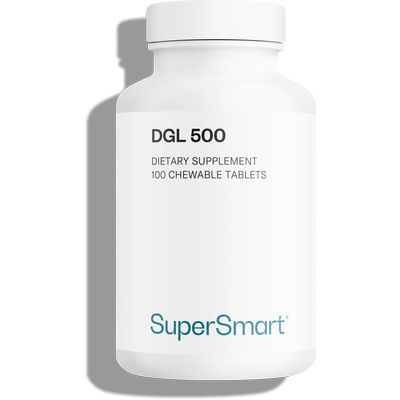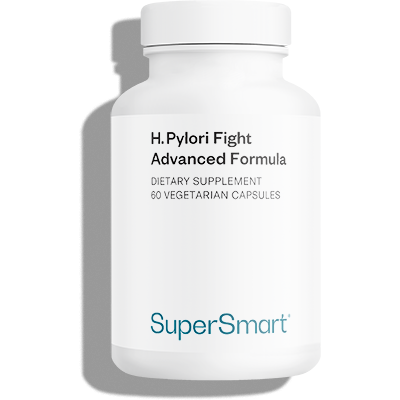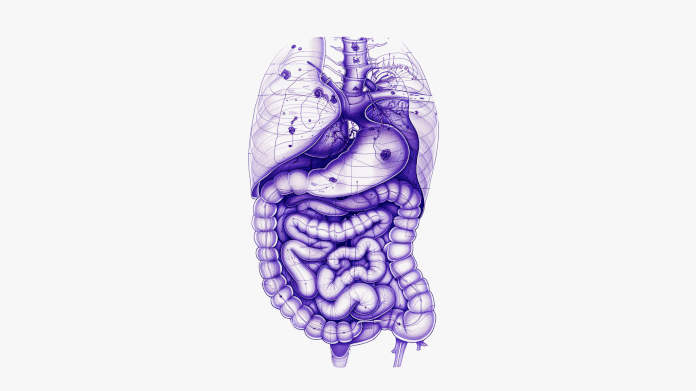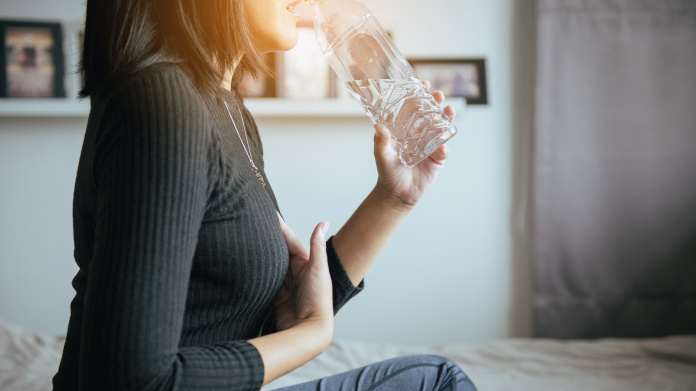What should you drink when you have a stomach ache?
Do you suffer from stomach pain? Discover which drinks can help and which can make it worse.

What’s causing your stomach pain?
The stomach is the organ responsible for breaking down solid food into a kind of semi-fluid mass called ‘chyme’.
It enables the digestive process to get underway, through muscle contractions and the secretion of highly-acidic gastric juices.
A number of different ‘malfunctions’ may be responsible for your stomach pain:
- indigestion (dyspepsia) as a result of eating an over-rich meal;
- part of your stomach contents coming back up into your oesophagus (gastroesophageal reflux). This causes heartburn and irritation as the unprotected oesophagus wall is exposed to acidity;
- a stomach ulcer. This is inflammation of the stomach wall, often related to colonisation by Helicobacter pylori, a type of bacteria which invades and destroys the stomach’s protective mucus layer. It can cause very painful internal lesions;
- gastritis, inflammation of the stomach mucosa. Gastritis is often due to repeated use of alcohol or medication.
Which drinks should you avoid in the case of stomach pain?
Limit caffeinated drinks
Drinks containing caffeine, such as tea, coffee, yerba mate, hot chocolate, cola, guarana and energy drinks increase acid production in the stomach and can exacerbate pain.
Avoid high-fat, high-sugar drinks
Sources of fatty acids, especially saturated ones, tend to aggravate any inflammation of the stomach wall, which is why it’s best to avoid full fat milk.
Sugars, meanwhile, promote acidity and attack the stomach wall. So avoid fizzy and mass-produced sweetened drinks (which includes many fruit juices, especially citrus fruit and tomato juice), flavoured drinking yogurts, etc.
Steer clear of alcohol
Alcohol, like caffeine, stimulates over-production of hydrochloric acid, and can upset the balance of the gastric mucosa over the long term.
By lowering the body’s defences and contributing to the development of lesions (1-2), it promotes the growth of Helicobacter pylori, often responsible for gastritis.
Studies have shown beer to be by far the worst alcoholic drink when it comes to stimulating acid secretion.
So it’s best not to drink it during painful episodes, and to restrict consumption more generally to no more than 2 alcoholic drinks a day.
Take care when it comes to drinks containing spices
Some people can be sensitive to certain spices (ginger or cardamom in chai, cinnamon lattes, cocktails with chili…) and should thus avoid them if they are prone to heartburn.
Best drink options when you have a stomach ache
Drinks high in soluble fibre
Dietary fibre, more specifically the soluble fibre found in vegetables, legumes and fruit, help protect the stomach lining.
Drinking vegetables juices is therefore recommended.
Some fruit juices can be drunk in moderation (opt for those made from passion fruit, pear, apricot and nectarine, high in soluble fibre).
Drinks rich in flavonoids
A number of studies suggest that foods rich in antioxidants, especially flavonoids, may slow down the growth of Helicobacter pylori.
It’s therefore a good idea to choose drinks made from flavonoid-rich fruits and vegetables:
- low-acid juices (with no added sugar) made from apple, banana, pear, strawberry, grape, melon;
- soups or juices made from peppers, celery, spinach, broccoli;
- teas made from thyme and dill;
- pistachio and cashew nut drinks.
Drinks rich in vitamin A
Several studies have shown vitamin A to be beneficial for inflammation of the stomach (3-4). It may therefore help to focus on drinks made from foods that contain it:
- carrot and melon juice;
- soups made from sweet potato and winter squash;
- les broths made from the leaves of beetroot, turnip and dandelion.
Water, infusions and herbal teas
Water is obviously the ‘gold-standard’ health drink and should be drunk in large quantities (dehydration being an aggravating factor in stomach problems).
It can also be drunk in the form of herbal teas (a few cups a day), by infusing or decocting plants with potential benefits for the stomach:
- marigold (Calendula officinalis), known to soothe the upper digestive tract;
- slippery elm (Ulmus rubra), the inner bark of which is believed to soothe the digestive tract;
- turmeric (Curcuma longa) which relieves inflammatory pain and facilitates digestion (5-6);
- German chamomile (Matricaria chamomilla), which helps relieve digestive discomfort through its anti-inflammatory components (alpha-bisabolol, chamazulene, apigenin and matricin) and numerous terpenoids and flavonoids (7-8);
- fenugreek which seems to play a part in the stomach’s physiological pH balance;
- and sage (Salvia officinalis) which supports normal stomach function.
Traditional home remedies typically include some of these plants which have documented effects.
Dietary supplements for the stomach
Probiotics for combatting Helicobacter pylori?
Scientists have highlighted the potential of probiotics in combatting Helicobacter pylori bacteria, particularly species from the lactobacillus family (such as those featured in the formulations H. Pylori Fight & H. Pylori Fight Advanced Formula).
It’s thought they are able to co-aggregate with the bacteria responsible for gastritis and stomach pain.
Chewable deglycyrrhizinated liquorice (DGL) supplements
Traditionally used for helping to relieve stomach problems, liquorice has recently been the subject of numerous studies designed to confirm its potential.
As a result of its glabridin content in particular (9), it is believed to stimulate mucus production in the stomach, thus boosting natural protection against the effects of gastric secretions and those of Helicobacter pylori.
Dietary supplements are particularly effective, but take care to ensure they contain deglycyrrhizinated liquorice (such as the chewable tablets DGL 500).
Other plant compounds for the stomach
You can also try other natural compounds associated with providing relief from regular stomach problems, such as amla (with the product Double Amla) or pistachia lentiscus (Mastic Gum).
SUPERSMART ADVICE
References
- Gottfried, E.B., Korsten, M.A., and Lieber, C.S. Alcohol-induced gastric and duodenal lesions in man. J. Gastroenterol. 70:587-592, 1978.
- Tamawski, A., Stachura, J., Ivey, K.J., Mach, T., Klimczyk, B., and Bogdal, J. Alcohol injury to the normal human gastric mucosa: endoscopic, histologic, and functional assessment. Clin. Invest. Med. 10:259-263, 1987
- Patty I, Benedek S, Deak G, et al. Controlled trial of vitamin A therapy in gastric ulcer Lancet, 2 (1982), p. 876
- Vitale G, Barbaro F, Ianiro G, Cesario V, Gasbarrini G, Franceschi F, Gasbarrini A. Nutritional aspects of Helicobacter pylori infection. Minerva Gastroenterol Dietol. 2011 Dec;57(4):369-77. PMID: 22105725.
- Comparative antiulcer effect of Bisdemethoxycurcumin and Curcumin in a gastric ulcer model system. Mahattanadul S, Nakamura T, et al. Phytomedicine. 2009 Jan 31.
- Curcuma longa extract protects against gastric ulcers by blocking H2 histamine receptors. Kim DC, Kim SH, et al. Biol Pharm Bull. 2005 Dec;28(12):2220-4. Texte intégral : www.jstage.jst.go.jp
- McKay DL, Blumberg JB. A review of the bioactivity and potential health benefits of chamomile tea (Matricaria recutita L.). Phytother Res. 2006 Jul;20(7):519-30. Review.
- Khayyal MT, Seif-El-Nasr M, et al. Mechanisms involved in the gastro-protective effect of STW 5 (Iberogast) and its components against ulcers and rebound acidity. 2006;13 Suppl 5:56-66.
- Khoshnazar, S.M.; Bahaoddini, A.; Najafipour, H. Effect of alcoholic extract of licorice (Glycyrrhiza glabra L.) rhizome on isolated duodenum motility in male rats and its interference with cholinergic, nitrergic, and adrenergic systems. Env. Pharmacol. Life Sci. 2013, 2, 173–177.
Keywords
15 Days
Reliable delivery
Reliable delivery. Good product.
Viva
29 Days
Great service
Great service
cl
31 Days
Received product promptly and its early…
Received product promptly and its early days but seems to have improved my daughters alertness.
Anandi
41 Days
Amazing
Amazing, great product!
ALEX Sinclair
44 Days
Good products and Swift handling
Good products and Swift handling
Trusted
49 Days
I trust the company's product
I trust the company's products, the quality is trustworthy and the speed of delivery is also appreciated.
NAJIB Malaah
49 Days
Good job.
This company is serious when it comes to serving it's customers. They are fast to send out the orders. Their site is great and easy. Also, they treat their return customers with great deals and discounts. Keep up the good work.
ABDULQADER Jehad
51 Days
I know frech ( level 3 of 6) and can…
I know frech ( level 3 of 6) and can read your messages, but since order are official documents I'd like to have this in english. Merci Ursula Mathes
Ursula Mathes
54 Days
I worried the delivery.
Box was intact, content correct but delivery time was 12 days. I started to worry!
VIITANEN Esa
57 Days
Supply of Chondroitin 6-sulphate
The company has provided the required product efficiently with no complications.
OldBear
58 Days
Supersmart sell a lot of interesting…
Supersmart sell a lot of interesting stuff. More than jut the usual vitamins though they do all those as well. Ordering pretty straightforward - you may need to try a couple of times to get the offers to apply but they do work. I queried something and had a fairly quick sensible reply. Postage takes a couple if days but you do get good progress information. Very well packed. Bought from Supersmart a few times and will do so again.
AT Griffin
12 Days
Excellent
On m'a mis bien.
cliente
15 Days
qualité des produits et services
qualité des produits et services
denis riegel
16 Days
Nehme das Produkt noch zu kurz um eine…
Nehme das Produkt noch zu kurz um eine Bewertung abgeben zu können
Ermelinde
16 Days
Très satisfait
J'apprécie la facilité de navigation sur le site, le suivi des commandes, et bien sûr, la qualité des compléments alimentaires.
LE COUR SERGE

